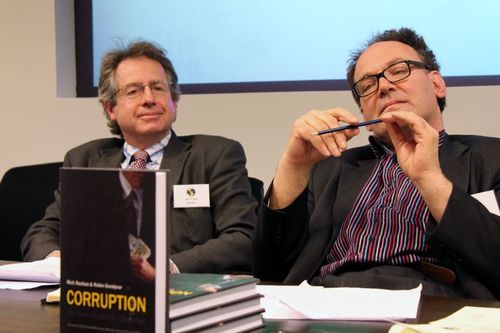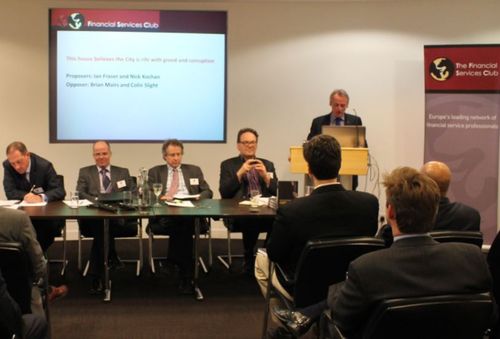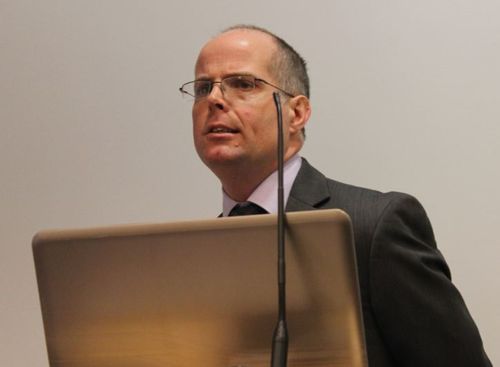
A short while ago, I mentioned that the Financial Services Club were to debate: This house believes that The City is full of greed and corruption.
We had the debate last week, and it was excellent with Ian Fraser and Nick Kochan, two enigmatic investigative journalists of our time, proposing the motion.

Ian Fraser (left) is an award-winning journalist, commentator and broadcaster who writes about business, finance, politics and economics. His work has been published by among others The Sunday Times, The Economist, Financial Times, BBC News, Thomson Reuters, Dow Jones, Daily Mail, Mail on Sunday, Independent on Sunday, the Herald, Sunday Herald, The Scotsman, Accountancy, CA Magazine and CityWire.
Since 2008 he has been consulting editor and blogger on Bloomsbury Publishing’s QFINANCE and also blogs for Naked Capitalism, a leading US website for economic and financial views. Some blogs are cross-posted on other sites including The Economic Populist and Seeking Alpha.
Since March 2009 he has been making programmes about the global financial crisis for the BBC. These have included a File on 4 documentary for BBC Radio 4 about HBOS, Trust Me I’m A Banker for BBC Scotland and Carry on Banking for BBC 1 Panorama.
Nick Kochan (right) is a commentator on banking and financial services on compliance and regulation, emerging markets, political and forensic topics.
His work on banking, financial services and the economy has appeared in The Financial Times, the Economist, the Banker and Euromoney magazines. He is regularly consulted by the BBC and Sky for commentary on economy and financial services.
In particular, Nick has established his leadership in the field of compliance and regulation with the publication of his book on money laundering (The Washing Machine, 2006) and more recently on Bribery and Corruption (Corruption: The New Corporate Challenge, 2011).
These two formidable beasts were set up for opposition by two equally formidable characters: Brian Mairs and Colin Slight.

Brian Mairs leads the Strategic Communications area of the British Bankers’ Association (BBA), and writes, commission and edits articles working with colleagues in the BBA’s Communications team.
A former journalist and HM Treasury press officer, Brian's City career has included heading communications for APCIMS (the Association of Private Client Investment Managers and Stockbrokers) and for CFA Institute across Europe.
Colin Slight is Managing Partner with the Realization Group, and leads the official charity for the Financial Services Club, MAG:NET, where I will be speaking on 5th July alongside Martin Bell, the white-suited independent politician and former war reporter.
The arguments began with Ian putting forward the case that the City used to be run on the basis of people who were interested in appropriate steerage of the City.
They had ethics, morals, judgement and values.
That changed over the past two decades to allow people to now run the City who have no sense of altruism. They just want to get rich quick.
If people are purely motivated by greed with no sense of ethics, then they rapidly move to abuse, as demonstrated by the recent letter about Goldman Sachs calling their clients muppets.
Various cases were cited from BCCI to Barings, RBS to HBOS, but most of this is under the Chatham House Rule so I cannot repeat word for word what was said.
What I can do is cite Ian Fraser’s blog where he regularly uncovers stories about rogue actions in the financial system, such as:
- Have NatWest and RBS gone rogue?
- Accusations of “systemic institutionalised fraud” at RBS fall on deaf ears
- The Worst Bank in the World? HBOS’s Calamitous Seven Year Life
- Rowan Bosworth-Davies | It’s time we stopped assuming bankers are gentlemen
As you can see, Ian is not a huge fan of the banks, or rather of the banks’ shenanigans, and works tirelessly to expose their misdoings and misdeeds.
It also intrigued me that he mentioned various folks, such as Rowan Bosworth-Davies. Rowan is an old mucker of mine and will be speaking at the Club in Q4, along with David Bermingham (one of the NatWest Three).
Ian’s thrust of dialogue is that banks were allowed to get away with a lot of greed, through the failure of regulators and government and the lack of appropriate auditing controls.
In fact, he is pretty darned livid that an auditor is now the top regulator, and believes this is where we have the major issue.
I quote this, as Ian blogged about the debate, stating that William K Black, associate professor of economics and law at the University of Missouri, Kansas City, gave testimony to the Federal Crisis Inquiry Commission in September 2010 saying as much:
By the time this crisis began economists (Akerlof & Romer 1993), regulators (Black 1993); and criminologists (Calavita, Pontell & Tillman 1997; Black 2003; Black 2005) had developed effective theories explaining why combining financial non-regulation and modern executive and professional compensation produced criminogenic environments that led to epidemics of accounting control fraud.
We also explained why these were near perfect frauds and explained how control frauds used their compensation and hiring and firing powers to create a “Gresham’s” dynamic that allowed them to suborn the “independent” professionals that were supposed to serve as “controls” and transform them into allies. (This is similar to HIV’s ability to infect the immune system.)
So there you have it. Extrapolating from Black, the ‘Big Four’ accountancy firms Deloitte, Ernst & Young, KPMG and PWC, whose duties as auditors are supposed to be to the shareholders not to the management of a company, have been behind the creation of a “Gresham’s” dynamic.
By this, I mean they have provided a cover for ‘white collar’ crime, in exchange for inflated audit fees (or what are increasingly being termed by the accountancy professor Prem Sikka and others as “bungs for silence”).
If true this makes them dangerous institutions, whose imprimatur should increasingly be seen as a negative rather than a positive by investment management firms with a genuine interest in safeguarding their investors money.
Hmmmmm ….
Ian’s seconder Nick was equally diligent in delivering his powerful mantra about City greed and corruption, opening with a video clip that was particularly amusing and engaging:
The video is from some years ago, and shows Saudi Prince Bandar bin Sultan talking about corruption charges.
Prince Bandar is son of the late Crown Prince Sultan bin Abdulaziz Al Saud.
Prince Bandar was ambassador to Washington between 1983 and 2005, and is Secretary General of the Saudi National Security Council.
He is thought to have fallen out of favour with other princes due to overzealous diplomatic efforts in recent years although, looking at a transcript of the video above, I am not sure he is that diplomatic, just honest:
The way I answer the corruption charges is this. In the last 30 years, we have implemented a development program that was approximately ... close to $400 billion worth, OK? Now, look at the whole country, where it was, where it is now. And I am confident after you look at it, you could not have done all of that for less than, let's say, $350 billion.
If you tell me that building this whole country, and spending $350 billion out of $400 billion, that we misused or got corrupted with $50 billion, I'll tell you, "Yes." But I'll take that any time. There are so many countries in the Third World that have oil that are still 30 years behind. But, more important, more important -- who are you to tell me this? ... What I'm trying to tell you is, so what? We did not invent corruption, nor did those dissidents, who are so genius, discover it. This happened since Adam and Eve. ... I mean, this is human nature. But we are not as bad as you think. ...
Nick then went through a litany of bank failures, corroborating Ian’s view that the City is rife with corruption and greed .
Answering such accusations is hard, but Brian and Colin proved to be more than up for the job.
Brian went through a long list of reasons why it is not pandemic to banks, but hard wired into the way in which humanity works.

From the ancient Greek and Roman times through to today, corruption and greed exists anywhere and everywhere it is allowed, and the banking system positively supports the regulation and governance of greed and corruption by being one of the only places where it can be traced, tracked and found.
In fact, the City is an excellent place to stop corruption and greed as this is where it ends up. That is why the laws around tracing Politically Exposed Persons (PEPs), Money Laundering and more are so integral to the banking system and this is where the governments can find those activities.
So greed and corruption is not rife in the City, but in life, and the City is a machine that can temper, trace, track and eradicate these activities, rather than being the place where it ends up.
Colin was even more offended by the notion that corruption and greed even go together in the same line, as they are totally unrelated.
Greed is programmed within all of us, which is why it is one of the seven deadly sins, but corruption is completely separate and if anyone thinks all of the thousands of people who work in banking are corrupt, then they are wrong.
Sure, there are a few bad apples to spoil the barrel, but that’s true of any industry – politics, religion, business, you name it. There will always be some rogues and scallywags, but the majority are good, honest, decent hard working people, and so calling all those people corrupt is inherently wrong.
Arguments well upt and well placed, but they did not wash with the audience who voted overwhelmingly in favour of the motion.
My take on it was that the motion was carried more on the emotion of the topic than the facts however, and personally see greed and corruption as being part of the makeup of humanity – along with lust, gluttony, wrath, pride, sloth and envy.
The Seven Deadly Sins have nothing to do with ‘The City’ as they exist within all of us, as part of humanity.
The only issue being that if the governance, regulation and politics allow excess in such sins then that is the issue and, yes, that has been the issue of the last decade.
In summing up, it was the allowance of greed through corruption that has been the concern shared by all and, for that motion – This House believes that the control system has allowed the City to over-indulge in greed and corruption – I, along with many others, would probably concur.
In conclusion, a video Ian presented sums up the case, and is worth half an hour of your time if you have the interest:
Chris M Skinner
Chris Skinner is best known as an independent commentator on the financial markets through his blog, TheFinanser.com, as author of the bestselling book Digital Bank, and Chair of the European networking forum the Financial Services Club. He has been voted one of the most influential people in banking by The Financial Brand (as well as one of the best blogs), a FinTech Titan (Next Bank), one of the Fintech Leaders you need to follow (City AM, Deluxe and Jax Finance), as well as one of the Top 40 most influential people in financial technology by the Wall Street Journal's Financial News. To learn more click here...

